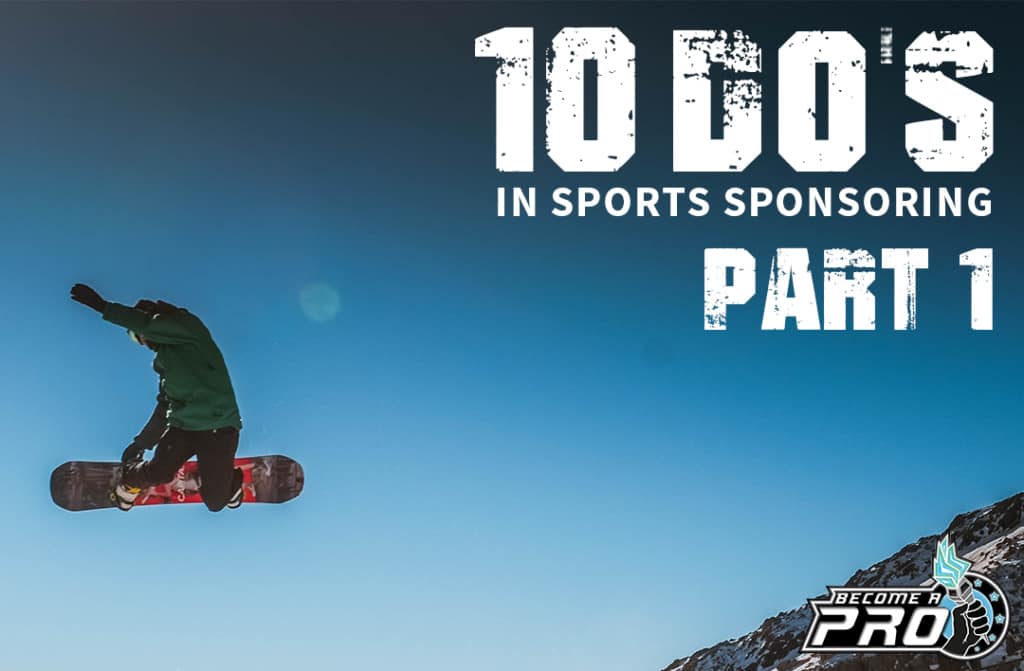1. Inform yourself which sponsors could be interesting for you: Find out the values, interests and products of the sponsor.
Might these points be interesting for you and do they suit to yourself? If you want to represent a brand properly, it is important that you identify yourself with the brand and can pass on its values.
Find out for what the sponsor is searching for.
Does the sponsor search for an athlete which wins a lot of competitions, has a huge community or a high social media reach?
Apart from that estimate realistic if you’re the one.
As an inexperienced athlete, think about whether you would fit in with a big brand or whether you should start out with smaller sponsorships to gain experience.
But also consider that you might miss the opportunity to get to know sponsors from the same industry. It is often difficult to change sponsors quickly if you are under contract. As an experienced sponsor, It is often difficult to change sponsors quickly if you are under contract.
As an experienced sponsor, it is of course important to consider which sponsors can further advance you, make you better known and support you according to your needs.
Another thing is that you should find out if the sponsor has already hired athletes.
This is helpful for you to get useful information like what is important to the sponsor during the application process, how satisfied are the athletes with the sponsorship, what is the community like or how are the sponsoring processes are handled in the company? If you do not know the athletes personally, ask in the community or contact them by mail or social media. We have met a lot of athletes and they are willing to help with any issues. This will give you a good overview about the brand thanks to the athletes and their knowledge.
2. If you apply for a sponsorship you should:
Find out how to contact the sponsor.
You should contact them in their preferred way. Options would be: Via phone, E-Mail, contact formular or directly. Some sponsors prefer to be contacted directly to get an idea of the athlete, because many sponsors are overloaded with E-Mails.
Find out which information the sponsor wants to have.
Sponsors are interested in personal things, such as your interests, what you do and work in addition to your sport, but also around you as an athlete. How often do you train, where is your training spot, have you built up a community, what are your previous successes, how many social media followers do you have, or what is your social media reach, have you had or are you having sponsors, what are your goals, have you already had a serious injury?
Apply with an individual application which suits to the brand.
Match your application to the sponsors. Read his application requirements and try to respond to them. Read his application requirements and try to respond to them.
Find out what else your application should consist of…
For a successful sponsoring application you should add meaningful pictures and videos to your application. The pictures do not have to be 100% professional, but should be authentic and convincing. Apart from that, you should of course be easily recognizable and it should be just you alone on the video.
Tell them how often your available.
The sponsors should know how often you train as an athlete, but also how often you can be available for them. How often do you go to competitions, how often are you at events or are you representing the brand?
Tell them how you could present their brand.
For a successful sponsoring it is important to inform the sponsor what you can provide for the sponsor. What is your plan to present the sponsor at events or competitions. How often do you want to post something for your sponsor on social media, how much reach do you generate and how should the posts look like?
Tell them if you have further knowledge in their products.
Examples would be: Do you know the sponsor’s products better, can you possibly repair and adjust the products yourself or edit and cut videos to show yourself perfectly? Think about what you can offer the sponsor, so why you are essential for them.
3. If the sponsor wants to enter a contract you should:
Check if you are able to fulfil the asked requirements. Check if the sponsor has every information, he needs about you like previous illnesses, sponsorships or what your full-time job is. Check if the contracts conditions which you have negotiated are properly right. Check the penalty for the breach of the contact and the notice period. Check the penalty for the breach of the contact and the notice period.
4. During the sponsoring you should:
Act professional and authentic. Do what you have promised the sponsor. Try to build up a relationship to the sponsor. It is always an advantage for sports sponsorship to be in good terms with the sponsor. Apart from this you should inform the sponsors about your successes and achievements.
5. During competitions you should
Present your sponsor in a right way. It is important that you act as a role model to others. Other athletes and young talents should look up to you and be happy about your tips and tricks. Of course, it is counterproductive to embarrass yourself in front of others or to throw a bad impression on the brand.
Try to improve yourself.
The better you are, the better the sponsorship. You will become better known, more interesting for other sponsors, find other athletes for training sessions or you can show even more impressive tricks at competitions or on social media.
Apart from this you should inform the sponsors about your successes and achievements. Of course the sponsors want to be informed about everything, you may be able to negotiate new deals with your sponsor in case of new successes. Another point is that you should try to achieve more than the requirements have been asked.



